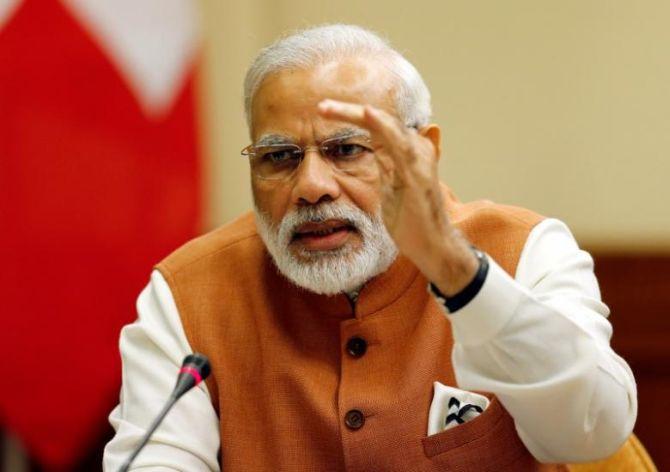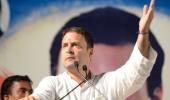Desperate times need desperate actions, and the BJP's only option is to enforce legislation to build a Ram mandir, says Sunil Sethi.

The gist of a famous Shakespeare quote is: When woes come, they don't come singly, they come in battalions.
The second week of December wasn't the brightest week for Narendra Modi, all-powerful prime minister and the BJP's pre-eminent lodestar.
It began badly with Reserve Bank of India Governor Urjit Patel abruptly quitting his job, like an uncomfortable dinner guest walking out without so much as a thank you nod to the host.
It ended far worse with the election results and the BJP's clear erosion of power in the Hindi heartland.
I happened to be at the local butcher's as the news trickled in.
Eyes cocked at the television on the wall, mutterings of "Harengay, Harengay!" (They'll lose, they'll lose!) were loud but not unexpected in the main Muslim establishment in the market.
For months the owner has complained of reduced meat supplies from adjoining Haryana and Uttar Pradesh and rising prices.
The losses of demonetisation may have subsided, but among shopkeepers, in a refrain of the BJP's heavy reversals in urban Madhya Pradesh, the biggest grouse is against the goods and services tax.
Many can't wrap their heads around the GST; online filing of returns can mean engaging accountants.
"It's a constant headache, and it's costly," says the owner of the largest general provisions store.
Together with falling agricultural incomes and rising joblessness in the hinterland, these major failures have put paid to the endless stream of subsidies and schemes flowing from the munificence of Modi raj.
The lure of cheesily-named central yojanas sprouting toilets, bank accounts, health insurance and LPG connections across the land left voters unmoved.
Mr Modi's goodie-bag has often pointlessly competed with State-sponsored dole, as in Vasundhara Raje's Bhamashah scheme in Rajasthan of cash handouts to women, or Raman Singh's massive toilet-building spree in Chhattisgarh.
In India Today's recent state-of-the-states development survey, Madhya Pradesh and Chhattisgarh are ranked third and fifth out of 21 big states as most-improved, and a cherubic Raman Singh is seen showering blankets on poor tribals but, still, he was cold-shouldered out of the chief minister's seat.
Finance Minister Arun Jaitley is right in describing the poll result as a case of 'fatigue'.
He might have said 'Modi fatigue' -- the fallout of a gigantic exercise in image-building that employs every forum and medium in promoting one single brand.
At home, Brand Modi is the party's big-ticket campaigner, sole policymaker and chief PR who sets cargo vessels afloat on the Ganga and unveils the Statue of Unity; overseas, he has a weakness for pomp and circumstance with rock star appearances at Central Park or Wembley Stadium.
The Modi juggernaut brooks little dissent.
RBI governors and CBI chiefs can go or be sent packing.
What Congress chief Rahul Gandhi at his press conference called the PM's 'arrogance' is actually a degree of self-regard and consuming hubris.
That Mr Gandhi addressed a presser hours after a fight he led from the front, in itself, is in sharp contrast to Mr Modi's disdain for the media.
No such exchange has taken place during the prime minister's tenure.
The Congress president, who will take on the Modi juggernaut next summer -- with its long-tailed caboodle of sadhus and dharam sabha leaders demanding the Rama temple, or hitmen who kill cattle traders and police officers -- seemed to be everything Mr Modi is not.
'We do not want to erase or ignore anyone,' he said of his surge in temple visits.
But he did not gloat, nor duck questions.
Confident but modest, he drew the battle lines clearly.
He was respectful of political foes and candid about errors of judgement and his steep learning curve.
Above all, he did not look like a tricked-out apparition on a self-promotion tour.
In short, Rahul Gandhi was a far cry from the grumpy son standing by his mother and mumbling regret at his party's pathetic 44 MPs in 2014.
About 130 million first-time voters will be added in the 2019 general election.
Some of this segment -- desperate for jobs and release from the stultifying dead-end of farm incomes -- may find Mr Gandhi an appealing alternative to Mr Modi.
That does not mean he is PM-in-waiting, only that the final heat of the race is close.
Desperate times need desperate actions, and the BJP's only option is to enforce legislation to build a Ram mandir.
This could unleash a wave of communal hatred -- the spoils of giveaways exposed as limited with diminishing returns.
An ambiguous fuzziness clings to Mr Gandhi but the worst of that halo is his accident of birth.
As fourth-generation heir to the Nehru-Gandhi dynasty, his large chamber of princes is led by Jyotiraditya Scindia and Sachin Pilot.
Is that reason to disqualify them from the big fight? Mr Modi's banner of 'Sabka saath, sabka vikas' is worn out and shop-soiled.
The country wants change.
That's the pointed message from the December 11 debacle.












 © 2025
© 2025